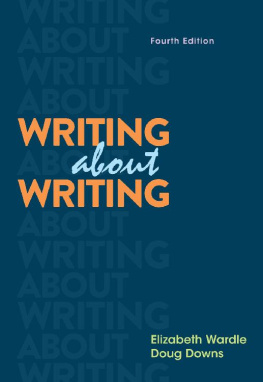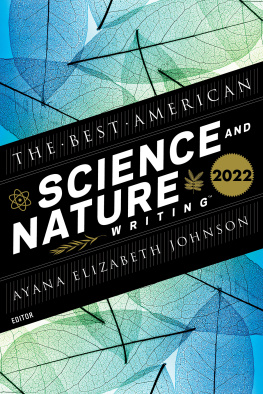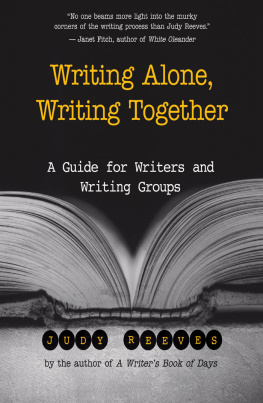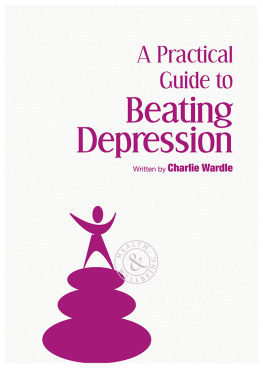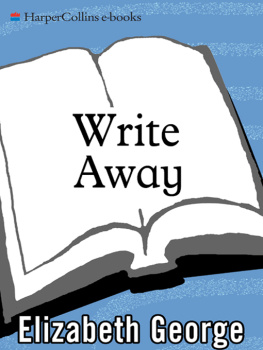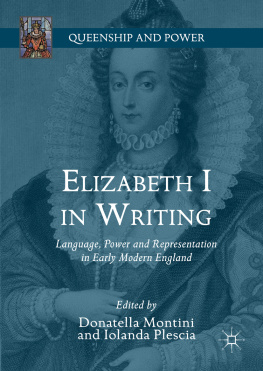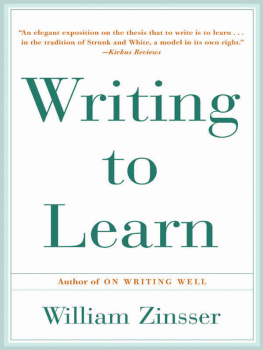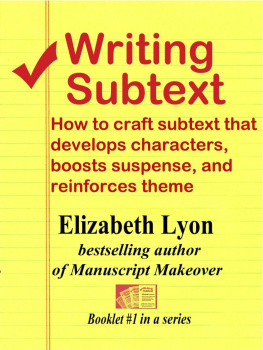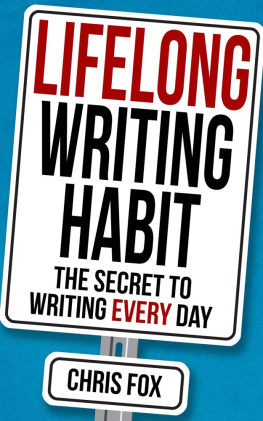Elizabeth Wardle - Writing about Writing
Here you can read online Elizabeth Wardle - Writing about Writing full text of the book (entire story) in english for free. Download pdf and epub, get meaning, cover and reviews about this ebook. year: 2019, publisher: Bedford/St. Martins, genre: Home and family. Description of the work, (preface) as well as reviews are available. Best literature library LitArk.com created for fans of good reading and offers a wide selection of genres:
Romance novel
Science fiction
Adventure
Detective
Science
History
Home and family
Prose
Art
Politics
Computer
Non-fiction
Religion
Business
Children
Humor
Choose a favorite category and find really read worthwhile books. Enjoy immersion in the world of imagination, feel the emotions of the characters or learn something new for yourself, make an fascinating discovery.
- Book:Writing about Writing
- Author:
- Publisher:Bedford/St. Martins
- Genre:
- Year:2019
- Rating:5 / 5
- Favourites:Add to favourites
- Your mark:
- 100
- 1
- 2
- 3
- 4
- 5
Writing about Writing: summary, description and annotation
We offer to read an annotation, description, summary or preface (depends on what the author of the book "Writing about Writing" wrote himself). If you haven't found the necessary information about the book — write in the comments, we will try to find it.
Writing about Writing — read online for free the complete book (whole text) full work
Below is the text of the book, divided by pages. System saving the place of the last page read, allows you to conveniently read the book "Writing about Writing" online for free, without having to search again every time where you left off. Put a bookmark, and you can go to the page where you finished reading at any time.
Font size:
Interval:
Bookmark:

The front cover.
Fourth Edition
- These three new chapters build the conceptual foundation for writing about writing.
- Every chapter in Part Two contains a set of readings with scaffolded support.
FOURTH EDITION
- ELIZABETH WARDLE
- Miami University
- DOUG DOWNS
- Montana State University

FOR BEDFORD/ST. MARTINS
Vice President, Editorial, Macmillan Learning Humanities: Edwin Hill
Executive Program Director for English: Leasa Burton
Senior Program Manager: John E. Sullivan III
Executive Marketing Manager: Joy Fisher Williams
Director of Content Development, Humanities: Jane Knetzger
Senior Development Editor: Cynthia Ward
Editorial Assistants: Alex Markle and William Hwang
Content Project Manager: Pamela Lawson
Senior Workflow Project Manager: Lisa McDowell
Production Supervisor: Robin Besofsky
Advanced Media Project Manager: Sarah OConnor
Executive Media Editor: Adam Whitehurst
Senior Manager of Publishing Services: Andrea Cava
Composition: Lumina Datamatics, Inc.
Text Permissions Manager: Kalina Ingham
Text Permissions Researchers: Kristen Janssen/Mark Schaefer, Lumina Datamatics, Inc.
Photo Permissions Editor: Angela Boehler
Photo Researcher: Richard Fox, Lumina Datamatics, Inc.
Director of Design, Content Management: Diana Blume
Text Design: Laura Shaw Design, Inc./Diana Blume
Cover Design: William Boardman
Copyright 2020, 2017, 2014, 2011 by Bedford/St. Martins.
All rights reserved. No part of this book may be reproduced, stored in a retrieval system, or transmitted in any form or by any means, electronic, mechanical, photocopying, recording, or otherwise, except as may be permitted by law or expressly permitted in writing by the Publisher.
1 2 3 4 5 6 24 23 22 21 20 19
For information, write: Bedford/St. Martins, 75 Arlington Street, Boston, MA 02116
ISBN 978-1-319-25338-7 (mobi)
ACKNOWLEDGMENTS
Text acknowledgments and copyrights appear at the back of the book on , which constitute an extension of the copyright page. Art acknowledgments and copyrights appear on the same page as the art selections they cover.
- Famous essay on the nature of drafting and revision, emphasizing the frequent need to let early drafts be bad drafts.
- Classic observational study of inexperienced writers composing, emphasizing patterns emerging from carefully coded texts and notes.
- Methodological exploration of early process-research protocols, comparing lab-based process observations against naturalistic observation of professional writer Donald Murray.
- Comparative study of how the two stated groups of writers approached and accomplished revision, including their assumptions about the nature and purpose of revision.
- Reports different strategies for writing used by fluent versus blocked student writers, finding that the common denominator for blocking is interference caused by adherence to rigid rules.
- Examines how students compose with multimodal resources including sounds, video, and images, noting a number of ways that these tools can make it more difficult to be effective for audiences.
- Illustrates how mindfulness and reflection can help us trace our growth as writers by investigating where this writers ideas come from and how he gets writing done.
- Provides advice on how to respond effectively to peers writing.
- Analyzes the idea of literacy sponsorship and demonstrates its application across various case studies.
- Illustrates the notion of literacy sponsorship with a short narration about her struggle to gain her fathers approval for her writing.
- Describes Villanuevas own literate experiences and how they are intertwined with his cultural background.
- A collaborative project by five students placed in a remedial writing course and labeled not yet proficient writers, in which they use what they learned in their first-year writing course to challenge their schools harmful labeling practices.
- Criticizes critics of student writing who fail to observe that how much readers notice and care about errors in a text depends on who they think the author is.
- Argues against the tradition of allowing only standard English in school and college, asserting instead that we should teach people how to code mesh by embedding multiple versions of a language in whatever writing or speaking theyre doing.
- Shows the many ways identity is enmeshed with language, recounting how Mellixs current experience of writing is shaped by her past experiences in particular places and times.
- Illustrates how identity and literacy experiences shape one another and how both shape writing experiences, from the perspective of a multilingual writer who never feels like a unified whole.
- Overviews key principles of rhetoric by integrating several theories of rhetoric into a narrative of how writing is rhetorical.
- Retheorizes rhetorical situation by defining and giving an extended example of elements that constitute this theory.
- Explains and analyzes numerous examples of intertextuality, texts being comprised of other, earlier texts and writers work.
- Examines reading as a meaning-constructing activity shaped by rhetorical principles, suggesting that readers who think rhetorically are more powerful readers.
- Extends Haas and Flowers work on rhetorical reading to the student research-writing situation, suggesting the teaching of rhetorical reading of sources.
- Argues that all forms of writing include the writer, even apparently objective or scientific forms.
- Looks at three writers who understand a photo of actress Emma Watson in very different ways, demonstrating how different observers can interpret the same symbolic action.
- Introduces the concepts of dominant, nondominant, primary, and secondary Discourses in order to discuss how people are socialized through language.
- Draws on theories about language in communities in order to examine how workers and patrons in a diner interact through language and texts.
- Offers a retrospective on developing his theory of discourse communities, while also evolving and updating the theory with additional elements.
- Explains the concept of discourse communities and focuses on how and why conflicts occur in them, particularly in academic communities.
- Demonstrates how groups of people such as medical professionals use language and texts in specialized ways as they work to accomplish their goals together.
Font size:
Interval:
Bookmark:
Similar books «Writing about Writing»
Look at similar books to Writing about Writing. We have selected literature similar in name and meaning in the hope of providing readers with more options to find new, interesting, not yet read works.
Discussion, reviews of the book Writing about Writing and just readers' own opinions. Leave your comments, write what you think about the work, its meaning or the main characters. Specify what exactly you liked and what you didn't like, and why you think so.

